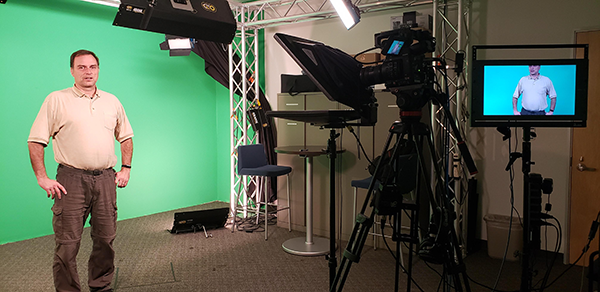Biomedical Engineering Class Popular with Students of All Majors

May 7, 2021 - One of the Samueli School of Engineering’s largest, most popular classes is filled with students of many different majors. Engineering Innovations in Treating Diabetes (Biomedical Engineering 3) is an innovative and completely online course taught by James Brody, associate professor of biomedical engineering.
Brody’s goal is to introduce students to the impact of engineering in medicine. He believes that all kinds of students, even those who aren’t interested in becoming an engineer or entering the medical field, can benefit from taking this class. “Understanding and interpreting medical research and the limitations of medicinal drugs are things that people run into their whole lives,” he says. “What I’m trying to do is get as many people as I can and make sure they have a basic understanding of biomedical science and how to interpret these things.”
BME 3 takes students through the developments and innovations in the treatment of diabetes. Students learn about purification of insulin, measuring and control of blood glucose, recombinant DNA, clinical trials and ethics. They also learn how to solve optimization problems in engineering with Excel. The class fulfills two general education categories: science and technology, and quantitative, symbolic and computational reasoning.
This year, 2021, marks the 100th anniversary of the discovery of insulin, and it was the history behind this discovery that inspired Brody to create the class. Before insulin, a diabetes diagnosis was basically equivalent to a death sentence. Patients were expected to live for about two to three years and be bedridden in their last months of life. Following the discovery of insulin in 1921, the first human patient received a dosage of insulin a year later and was able to make a miraculous recovery. “What I’ve done is build a class about biomedical engineering out of that story,” Brody says.
This is the second year he has taught the course, and it has always been taught online, even before the COVID-19 pandemic and remote learning became required. He says the online format brings unique benefits, including accessibility. “The online class allows more people to participate because they’re not constrained by the schedule,” he says. This past winter, 570 students enrolled, a large increase from last year’s 196. There were high numbers of students from other majors, including 60 criminology majors and 74 business economics majors. The class, which is funded by UC’s Innovative Learning Technology Initiative, is open to students from other UC campuses.
The class also takes advantage of online tools such as Perusall, which allows students to annotate important texts, propose thoughtful questions and respond to questions from peers. “For discussions, it’s a great way to get students to engage in what we call peer-to-peer learning,” Brody says.
The class feedback reflects the dynamic nature of the course, and student reviews highlighted the class’s engaging material and Brody’s passionate teaching style. One student wrote, “Professor Brody efficiently organizes and structures the course on a weekly basis to facilitate the access to specific lectures, assignments and quizzes. Although the class size was tremendous, Professor Brody creates discussions to actively engage the students in communicating with one another.”
The class topic, diabetes, is highly relevant to today’s world. Whether we realize it or not, diabetes sufferers can be found almost anywhere. “Pretty much everyone knows someone who has Type 1 diabetes, but a lot of times, we can’t even tell that a person has it,” Brody says.
– Sherry Ngo
